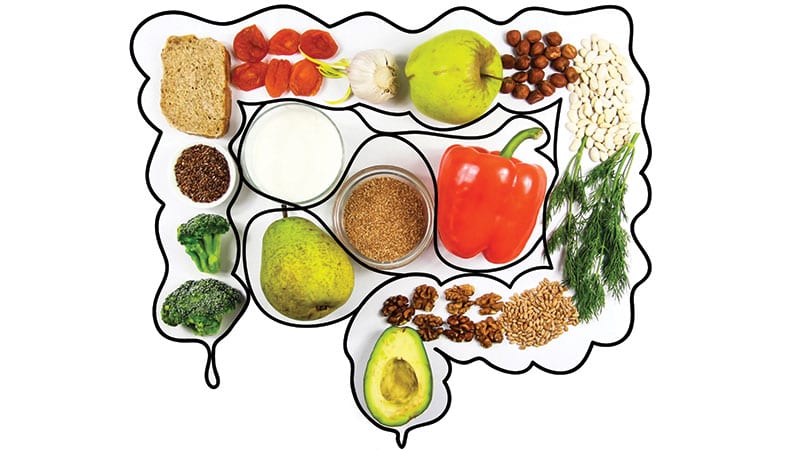Supporting our microbiome through nutrition
By Danielle O’Keefe and Melissa Conley, guest contributors
This article was originally published in September 2020

Humans coexist with trillions of symbiotic microorganisms inside our bodies, collectively called the gut microbiome. These organisms enjoy the nourishing habitat our bodies provide in exchange for such health benefits as regulating our immunity, protecting us from pathogens, providing nutrients, and maintaining the integrity of our gut. Claims about supplements, foods and dietary patterns to support our gut microbiome are nearly as abundant as our microbes themselves. But what does the science really tell us about how nutrition can support a healthy gut microbiome?
The microbiome is a complex ecosystem, making it difficult for scientists to determine what exactly constitutes “healthy.” It is composed of both beneficial and pathogenic bacteria that normally cohabitate in balance and stay relatively stable throughout our lives. Changes to our gut microbiome, both which specific microbiota are there and what functions they are performing, have been observed with certain dietary patterns, disease states like ulcerative colitis, or use of medications like antibiotics. What is not entirely clear is what those observed changes mean in relation to our health. Since many gut microbiota can perform similar functions, it appears that a simple change in microbiota composition may not necessarily be detrimental. While much more research is needed in order to understand what constitutes a healthy microbiome, researchers have identified multiple ways nutrition can support beneficial gut bacteria, including consumption of prebiotic foods, probiotic supplements, and probiotic foods.
Prebiotics are non-digestible foods that stimulate the growth and/or activity of microbiota and improve host health. Like any other living organism, gut microbes need food from which to extract energy and nutrients. Remarkably, our microbes eat the very food we eat but can’t digest ourselves, like some types of fiber. Since humans lack the enzyme needed to digest and absorb fiber, these indigestible carbohydrates reach the colon relatively intact, where microbes with enzymes to digest it await a fibrous feast. Supporting these microbes is one of many advantages of eating fiber, in addition to its established role in promoting digestive regularity, lowering cholesterol levels, and improving glycemic control. Our gut microbes readily metabolize soluble fiber through fermentation, resulting in the production of nutrients such as fatty acids, amino acids and essential vitamins. These nutrients may be used by the microbiota themselves or by the host. Soluble fiber is the most commonly fermented fiber, with good food sources including oats, bananas, beans, and onions. Overall, the Dietary Guidelines for Americans 2010 Committee (DGAC) determined that meeting the Institute of Medicine fiber recommendation of 38g per day for men and 25g per day for women, with an emphasis on eating a variety of fiber types, ensures enough food for whatever gut bugs are colonizing your inner ecosystem.
Another option to support your gut microbiome is to consume a probiotic supplement. Rather than feeding your existing microbes, a probiotic introduces live bacteria thought to be beneficial. A physician may recommend a probiotic supplement following a course of antibiotics, which are medications that prevent infection of harmful bacteria but have also been shown to deplete beneficial bacteria. It’s important to take an antibiotic as prescribed, but some individuals with subsequent digestive issues like diarrhea may benefit from a probiotic supplement. Lactobacillus and Bifidobacterium are typical species used because they have been the most well-studied and are shown to improve digestive symptoms, as well as prevent infection of opportunistic bacteria.Importantly, probiotics don’t appear to stay in the gut once someone stops taking them, so this intervention is likely transient. Taking probiotics aren’t likely to do any harm, but eating prebiotics is a more cost-effective alternative to support the microbiome.
A popular way people consume probiotics is by eating fermented foods. Common choices like yogurt, kefir, miso, tempeh, fermented vegetables (such as kimchi) and kombucha naturally contain live bacteria due to the fermentation process. Yogurt, for instance, is made by fermenting pasteurized milk using Lactobacillus bulgaricus and Streptococcus thermophilus starter cultures. Manufacturers may additionally augment their product with other bacterial strains to boost the probiotic content. Notably, there have not been many studies evaluating just how much of the beneficial bacteria in these probiotic foods actually shows up in the colon. Due to this lack of evidence that fermented foods definitively support gut health, the DGAC generally supports consumption of fermented foods but doesn’t make specific recommendations regarding what quantity might be beneficial for health. They do, however, offer the advantage over supplements of presenting an abundance of other nutrients that are a welcome part of a healthy, balanced diet.
As scientists continue to unravel the mystery of our mighty microbes, consumers and healthcare providers alike look forward to the exciting implications for making more targeted dietary and supplement recommendations to optimize our health. The evidence we have now points to nourishing our bacterial allies through eating adequate fiber and fermented foods, particularly those containing soluble fiber. The beauty of symbiosis is that what nourishes us nourishes our symbiotic gut microbes, too.

Look for regular Sound Consumer articles over the next year from Danielle O’Keefe, a student in the Master of Science in Nutrition and Master of Arts in Counseling Psychology Dual Degree program at Bastyr University. Melissa Conley, PhD. is an assistant professor in the Department of Nutrition and Exercise Science.
A pioneer in natural medicine, Bastyr University is a nonprofit, private university that is at the forefront of developing leaders in natural health arts and sciences for the 21st-century. Bastyr offers graduate and undergraduate degrees in science-based natural medicine that integrates mind, body, spirit, and nature. The University is also a leader in conducting cutting-edge research in complementary and alternative medicine and in offering affordable natural healthcare services in its local communities.
